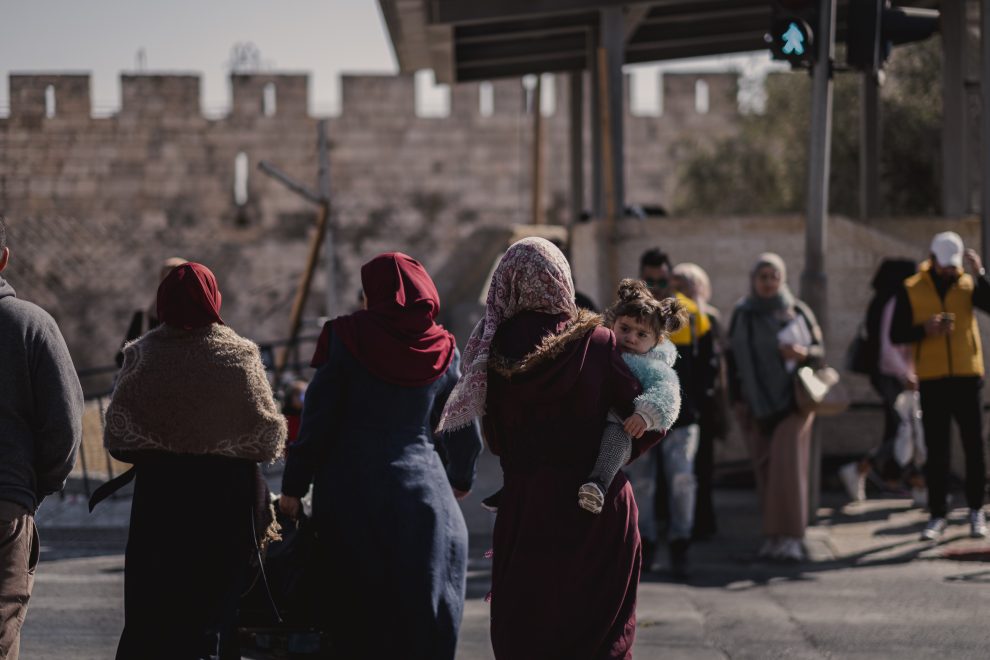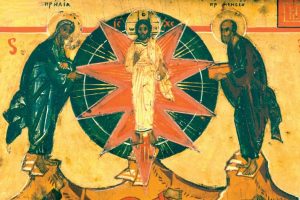The names of the people mentioned in this essay have been changed to protect their privacy.
In October 2011, I visited the Holy Land as a pilgrim. We stayed in the Old City, near the Church of the Holy Sepulchre. Every morning, when we went to Mass at the Sepulchre, as the priest held aloft the Eucharist, it was like witnessing the Resurrection of Christ from the tomb: “Behold the Lamb of God.” It was a transcendent experience—but I also had another sort of spiritual experience while I was in the Holy Land, one rooted in the political conflict that persists across the sacred plains.
In Hebron, I saw firsthand the apartheid conditions in which the Palestinian people live. My group passed shuttered buildings; we saw schools covered in graffiti. We passed through several security checkpoints to get to al-Ibrahimi mosque, and we witnessed the Israeli Defense Forces (IDF) shut down a shop that belonged to a friend of our tour guide. The IDF then forced my group to leave the Old City entirely. Samir, our tour guide, was frustrated and embarassed at what happened.
These experiences were in sharp contrast to our visit to Bethlehem, Samir’s hometown. After leaving the Church of the Nativity, he escorted us into a much smaller, much newer church across the road. There was no hustle and bustle of tourists visiting this site, and the lights were off—but it was still bright enough to see the smile on Samir’s face. “This is where I got married,” he told us. “It has been my church my whole life.” He recounted how he met his wife and told us about his family life as a father. This church, I realized, wasn’t merely a religious site for pilgrims to visit; this was his home, his history, and he chose to share it with us. I’ll never forget that moment, for it completely upended my political perspective.
Before I went to the Holy Land, the Palestinian-Israeli conflict had seemed like a faraway, nebulous conflict. The fighting was about ideologies, I assumed, and because ideologies can’t really be overcome, the violence and devastation would simply persist forever—and that’s all that could really be said about it. Like many people, I advocated for a two-state solution without much belief that it would ever actually happen. But now—and suddenly—the scales dropped from my eyes. I could no longer think about this conflict, or politics more broadly, in terms of theory. Uncommitted “awareness” and theoretical debate, I realized, just weren’t enough. Politics are never abstract. They always affect human beings, individuals who are as real as you and me.
After I saw glimpses of Samir’s interior life—first, his anger in Hebron, then his joy in Bethlehem—this truth came alive for me: I could no longer think only about the issues of the struggle; now, I was overwhelmingly aware of the individuals in the struggle. I recognized in Samir our shared humanity; I saw in him the same complexity of emotions and intentions that I experience. What’s more, my empathy for Samir allowed me to walk with him through his reaction. This combination of interiority and empathy is at the core of our respect for human dignity—and needs to be at the core of the politics of the person.
This isn’t a unique insight; all the great personalist philosophers recognized this, and it animated each of their individual lives. Dietrich von Hildebrand, for instance, used these same ideas to critique the emerging Nazi project in 1920s Germany. He condemned racism, nationalism, and antisemitism, all rooted in the reality of failed or warped relationships. Edith Stein was also critical of nationalism, even before her conversion to Christianity. After her baptism, in a great act of empathy and solidarity, she allowed herself to be taken to Auschwitz; she refused to use her Christianity to separate her from people suffering for their Jewish identity. But perhaps no personalist was more strongly animated by these principles than Martin Buber, a Hasidic Jew.
At the core of Buber’s philosophy, coloring everything he did and fought for, was a spiritual understanding that considered a person’s own interiority—the “I”—in relationship with another person—the “Thou.” In recognizing the other person’s “Thou,” Buber taught, we enter into a spiritual communion that allows us to coexist with them in a meaningful way, in real dialogue and exchange of self. We are no longer isolated in our singular and selfish concerns; together, we become “I-Thou.” An early Zionist, Buber advocated for peaceful coexistence between Jews and Palestinians. His I-Thou perspective shaped his dislike of the 1947 Partition, and contributed to his continued criticism of the State of Israel, right up until his death in 1965.
A true politics of the person, built on I-Thou relationships, goes far beyond any left-right dichotomy. A sense of relationship is the animating force behind all compassionate politics, while extremisms are always rooted in a breakdown of that relationship. When we fail to recognize and participate in the dignity of other people, then, all too often, our politics lead to war and oppression.
The brutal violence we saw from Hamas on October 7, when 1,200 people were killed and another 240 were kidnapped, revealed a complete disregard for personal dignity. No I-Thou relationship was visible in the devastating photos and videos from those communities. Meanwhile, the scenes from Gaza were equally shocking, with 13,000 people killed by Israeli forces, including 5,000 children (as of this writing). Any heart alive with empathy cannot help but weep and yearn for justice.
Shortly after the attacks, the Slovenian philosopher Slavoj Zizek said something that resonated with me. After condemning without reservation the violence of Hamas, he said, “Israel has the right to respond . . . but how it does so concerns us all.” The great tragedy of war isn’t that there are winners and losers, but that a sense of our common humanity is lost in the process. The reality that lives are lost in war is a tragedy, but an even greater tragedy is that some lives are seen as more valuable or meaningful than others. Death becomes just a number, a statistic on an unfolding Wikipedia page to be debated or denied. The lack of an I-Thou relationship numbs us to the reality of human pain.
A couple of weeks ago, I spoke with our tour guide Samir. He told me he no longer takes pilgrims to Hebron. The risks of being there are too much for him, and he would rather never see the city ever again. Moreover, he’s telling his son to begin plans to leave Palestine. Samir wants his son to find a new life somewhere else, because life in Bethlehem and the West Bank lacks human dignity.
I listened sadly as Samir said he wanted his son to leave and never return, while simultaneously saying he himself could never leave. Palestine is his home, the home of his ancestors, and he will die there before abandoning it. His interiority is still impressive to me, twelve years after my visit to the Holy Land. I hope I can live up to what I have learned from him.
Photo by Levi Meir Clancy on Unsplash













Add comment